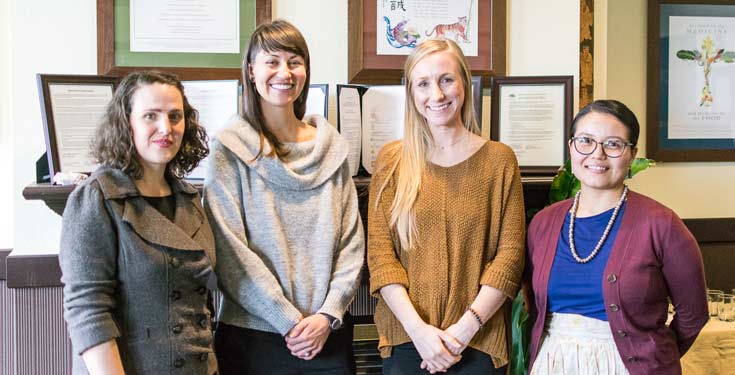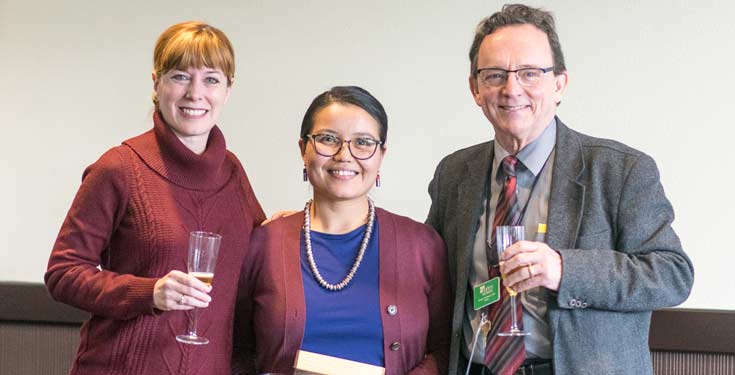PORTLAND, Oregon —The Oregon Health Authority (OHA) has awarded National University of Natural Medicine (NUNM) a biennial grant of $250,000 to provide educational scholarships for a select group of naturopathic medical students through the Scholars for a Healthy Oregon Naturopathic Physicians Opportunities (SHONPO) program. Upon graduation, the student recipients agree to provide healthcare services as primary care practitioners to Medicaid patients in medically underserved areas of Oregon. The SHONPO program provides each naturopathic student up to $35,000 per year through graduation.
The scholarship funds were made available by the Oregon legislature and OHA in 2017 as a healthcare incentive program to address lack of access to health care in underserved communities. While a small number of states offer financial incentives to naturopathic doctors (NDs), Oregon is the first to offer scholarships to retain its most promising future naturopathic doctors to address the medical practitioner shortage.

Tafflyn Williams-Thomas, MBA, NUNM’s director of Career Services, who is overseeing the launch of the SHONPO scholarships, said four NUNM students have been identified as the inaugural award recipients. “We were looking for students with the vision, skills, experience and commitment necessary to address the needs of medically underserved Oregonians for this landmark program. We are delighted to announce that naturopathic medical students Kelsey Barnett, Andrea Bustamante, Maya Rios, and LaKota Scott all submitted exceptional applications that far exceeded that criteria.”
A Perfect Confluence of Needs and Goals
The NUNM scholarship awardees may choose to practice in any of the areas designated by OHA as an underserved area at the time of graduation. Those areas are defined as falling below the median threshold of unmet needs. A majority of NUNM’s naturopathic students are often motivated to practice medicine due to healthcare inequity and lack of access to healthcare for underserved populations, but for NUNM student LaKota Scott, the SHONPO scholarship addresses a more personal and deeply held goal. Raised in Tuba City, Arizona, located on the northwest side of the Diné (Navajo) Nation north of Flagstaff, Scott grew up volunteering in the hospital there and has long aspired to practice medicine within indigenous communities.

Noting that the scholarship grant will alleviate the burden of paying her last two years of tuition and fees, Scott believes the scholarship also has a number of other important advantages, including preceptorship opportunities through the OHA’s Office of Rural Health. After completing her residency program, Scott is planning to meet her OHA scholarship obligation on the Confederated Tribes of Warm Springs Reservation.
Scott said that her volunteer service in her hometown hospital reinforced her desire to be a medical practitioner. She remembers that she was asked to be an interpreter for many of the Diné-speaking patients who entered the hospital. “I realized that they needed someone who understood not only their language, but their cultural values and belief systems—that was missing in the care they received from non-native medical providers. Naturopathic medicine resonated with the way I grew up and the way I understood healing culturally.”
Scott is looking forward to her future career in Oregon. “I’m very thankful for the opportunity to expose Oregon’s tribal communities to naturopathic medicine,” she said. The SHONPO scholarship has already altered her future plans, Scott said, noting that originally she planned to return directly to Arizona. “I’ve shifted my career plans to stay in the Pacific Northwest after graduation and am now focusing on studying to practice family medicine.”
Oregon’s History of Support for Naturopathic Medicine
Williams-Thomas notes that Oregon has been a leader in naturopathic medicine since 1927, when it first awarded licensure to NDs in the state. Said Williams-Thomas, “The State of Oregon has a long history of being on the leading edge of healthcare innovation. This is particularly true of its recognition of the naturopathic medical profession and its confidence in the quality of NUNM medical education, clinical training and care. From expanding our pharmaceutical formularies in 2009, to large grants from the Oregon Health Authority to treat patients, to recognizing our clinics as top-tiered Patient-Centered Primary Care Homes, NUNM has been fortunate to build a strong alliance with our partners at OHA. We’re particularly grateful for the SHONPO scholarships that directly benefit our students.”
NUNM has graduated more than 2,500 NDs since 1956. NUNM’s accredited naturopathic program is an intensive four-year medical degree. The first two years are focused on biomedicine courses: anatomy, biochemistry, immunology, microbiology, pathology and physiology. Students begin clinical observations and preceptorships in their first year. They also take more than 300 hours in nutrition alongside a comprehensive study of the microbiome. The objective is to incorporate nutrition as a fundamental part of every clinical diagnosis. In addition the program also includes botanical medicine, pharmaceutical medicine, midwifery, minor surgery, mind-body medicine and physical medicine, among other modalities.
Naturopathic medicine provides safe, cost-effective and preventive health solutions for minor, chronic and acute conditions. The goal of a naturopathic doctor (ND) is to identify and treat the root cause of a patient’s health complaint by combining natural therapies with modern science to help facilitate the body’s inherent ability to restore and maintain optimal health.
Learn more about SHONPO, and about NUNM’s naturopathic medicine program.